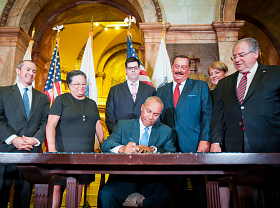A newly enacted law in Massachusetts will adopt the “Disclosure, Apology, and Offer” approach to help resolve malpractice cases.
The healthcare cost control bill — recently passed by the Massachusetts legislature and signed by Gov. Deval Patrick on August 6 — contains specific language that facilitates an approach of “Disclosure, Apology, and Offer” (DA&O) to address medical malpractice claims.
Under the DA&O model, healthcare professionals and institutions and their insurers disclose to patients and families when unanticipated adverse outcomes occur; investigate and explain what happened; establish systems to improve patient safety and prevent the recurrence of such incidents; and, where appropriate, apologize and offer fair financial compensation without the patient having to resort to legal action.
Approval of the law makes Massachusetts the first in the nation to have comprehensive legislation that will enable the conduct of a DA&O program in different practice environments with different insurance arrangements.
Patients will still have the right to consult an attorney to advise them of their rights and to evaluate the fairness of any offer or to bring legal action if they so choose.
‘Historic and Unprecedented Partnership’
Representatives from the physicians’ and attorneys’ groups in Massachusetts say “a historic and unprecedented partnership” has led to significant reforms to the medical liability system, allowing for improvements to resolving malpractice cases that both sides say could greatly benefit patients — by reducing some unnecessary and protracted lawsuits while improving patient safety.
The groups applauded the legislature and governor for their support of the reforms and including them in the cost control reform bill. An agreement on language in the bill among three principal groups – the Massachusetts Medical Society, Massachusetts Bar Association, and Massachusetts Academy of Trial Attorneys – made the changes possible.
According to the alliance, doctors are describing the DA&O approach as an improvement to the current tort system, which observers say can sometimes lead to a culture of silence and a “deny and defend” attitude in the medical community, impedes improvements in patient safety efforts, and motivates physicians to practice defensive medicine that contributes to higher health care costs.
Cutting Healthcare Costs
Alan Woodward, chair of the Massachusetts Medical Society’s Committee on Professional Liability, described the agreement on the DA&O approach as an extraordinary accomplishment.
“It will encourage transparency and honesty, protect the rights of patients who have been harmed by avoidable events, improve patient safety, reduce litigation, and ultimately cut health care costs,” Woodward said.
“I applaud the members of the legal profession for their collaboration to bring about this agreement and thank the legislature and the governor for their support,” said Woodward.
Jeffrey Catalano, vice president of the Massachusetts Bar Association, added, “Fairness is the child of transparency. Too many victims of medical errors are delayed or denied needed compensation due to lack of transparency.”
“The MBA is pleased and honored to have worked with MMS, the governor, and the legislature to create a law that is in the best interests of patients in that it requires full disclosure, and encourages early resolution while also protecting a patient’s right to seek legal assistance to ensure fair compensation. Hopefully, full disclosure will also nurture learning that will reduce medical errors in Massachusetts that cost too many injuries and deaths each year,” Catalano said.
“Importantly, this collaborative effort resulted from the fact that both doctors and lawyers appreciate that disclosure of mistakes also allows healing for both the patient and the physician.”
Timothy Kelleher III, president of the Massachusetts Academy of Trial Attorneys said, “This legislation is intended to ensure that patients will be provided with full disclosure regarding their medical treatment and why they were harmed by avoidable events.”
Honesty and transparency are paramount to the success of this bill and improving patient safety, Kelleher said. “We applaud the Massachusetts Medical Society’s commitment to these important goals. MATA thanks the Legislature and governor for their incredible effort on this bill.”
Source: Massachusetts Medical Society, Massachusetts Bar Association and Massachusetts Academy of Trial Attorneys
Topics Massachusetts
Was this article valuable?
Here are more articles you may enjoy.



 World’s Growing Civil Unrest Has an Insurance Sting
World’s Growing Civil Unrest Has an Insurance Sting  US Supreme Court Rejects Trump’s Global Tariffs
US Supreme Court Rejects Trump’s Global Tariffs  Experian Launches Insurance Marketplace App on ChatGPT
Experian Launches Insurance Marketplace App on ChatGPT  Florida Regulators Crack the Whip on Auto Warranty Firm, Fake Certificates of Insurance
Florida Regulators Crack the Whip on Auto Warranty Firm, Fake Certificates of Insurance 

